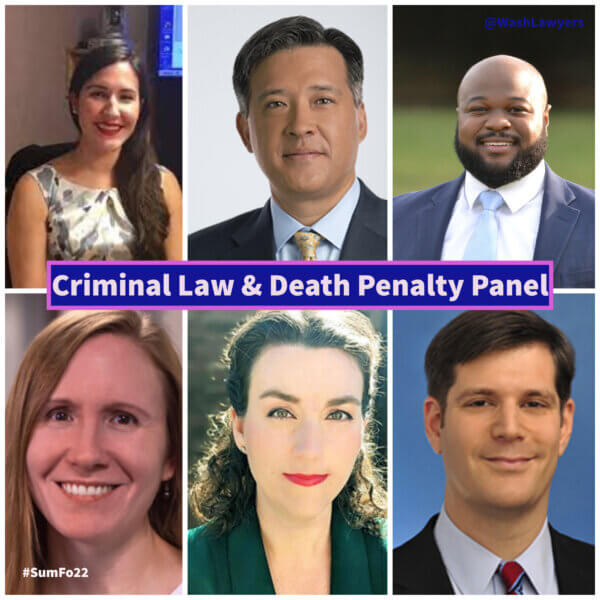
2022 Summer Forum: Pro Bono Lawyers Literally Can Save Lives
By Kelly Panlaqui
On Thursday, June 16, we held the third panel discussion of our 2022 Summer Forum focused on opportunities in criminal law and death penalty representation. Stephon Woods, an attorney with the U.S Department of Housing and Urban Development facilitated the conversation between the following panelists:
- Naida Henao, Network for Victim Recovery DC
- Emily Olson-Gault, ABA Death Penalty Representation Project
- Andy Wise, Miller and Chevalier
- Matt Hellman, Jenner and Block
- Tara Chen, Public Defender Service for the District of Columbia
Our panelists began our discussion with what led them to this work. For some, it was classes or clinical experiences in law school. For others, it was the first time they took on a pro bono criminal case. But all our panelists are dedicated to pursuing ways to challenge and fundamentally change the criminal justice system. In order to pursue change, clients must be at the center of this work. And in order to be an effective advocate, Andy shared it comes down to understanding as best you can what it really means to serve in jail. There are many factors that culminate in a client’s incarceration; some clients may have intellectual issues, some may come from violent backgrounds or have been victims of violence themselves. Most have faced insurmountable challenges and did not have resources available to them to overcome these challenges. Understanding where a client comes from enables advocates to better express a client’s story and contextualize the experiences that lead to the situation. As one panelist put it, our clients should not be judged by the worst moment of their lives.
Our panel also addressed some of the more recent incidents that have shaped their work in recent years. Tara focused on the topic of racial inequality and police reform in light of the many deaths of black and brown people and the Black Lives Matter movement. Naida stressed the importance of innovation within the criminal justice system and the huge impact pro bono lawyers have on minority communities through client representation and systemic advocacy. As Tara shared, there are many points at which a pro bono lawyer can impact the system and change the outcome for a client. Part of this work is actively trying to come up with alternative sentences, diversion programs, education avenues, or other alternatives to incarceration that serve clients, victims, and the community.
As demonstrated by our panelists’ bios, there are many varied paths to this work. Volunteering, internships, pre-law school work experience, and connections made are all ways to find where your passion lies. If it is with this work, there are numerous opportunities to become involved. Emily shared the ways in which she became involved in law school as just one example. The resources below can help you start on that path.
This work is not for the faint of heart. Secondary trauma and other challenges often burn out an advocate in this arena. So, the discussion concluded with words of advice from the group as they emphasized the importance of having a support system. It is this support system that will help you get through the tough losses and keep you pushing for change. Matt entreated the audience to volunteer by reminding us all that in this area “pro bono lawyers save lives”.
Additional Resources:
https://www.nvrdc.org/volunteer
https://www.americanbar.org/groups/committees/death_penalty_representation/
https://www.americanbar.org/groups/public_interest/
Kelly Panlaqui is our 2022 Summer Intern.






